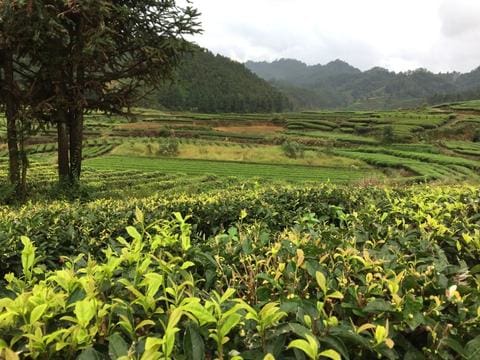
The Truth about Pesticides and Tea
You may have read reports about pesticides, herbicides, toxins, and other carcinogens possibly contaminating your teas. Unfortunately, these concerns are not unfounded. Multiple, independent organizations have conducted research and tested different kinds of teas, and the results have been disheartening. Fortunately, there is something that you can do about it.

The History
Back in 2012 and 2013, an investment company known as Glaucus Research Group released reports claiming that a 3rd party independent lab they had selected showed that there were significant levels of pesticides and carcinogens in Teavana and Celestial Seasonings teas. The company admitted that there was a conflict of interest, acknowledging that they will profit if the stocks of those respective companies fell, but they also insisted that the research was valid.
In response to the claims by Glaucus, both Teavana and Celestial Seasonings released their own reports that alleged to prove that their teas were safe, and both noted the conflict of interest of the company reporting the research. Whether or not there was ever any truth to Glaucus’ claims, the reports had made their rounds through the media and had everyone wondering exactly how safe tea really is.
Earlier in 2012, the environmentalist nonprofit organization, Greenpeace, had conducted their own research through an independent lab, testing 18 samples of medium-grade teas from 9 popular Chinese tea companies in Asia. The lab results showed that all samples were contaminated with pesticides, some banned in China and others flagged by the European Union as toxic.
In 2014, Greenpeace also released a report on Indian tea companies. Using another lab, they submitted 49 samples from 8 of the 11 most popular tea companies in India for testing. The results again found the presence of pesticides that have been labeled as hazardous by the World Health Organization, including some that were supposed to have been banned for use in India. While some of the named companies agreed to take aggressive measures to research their own teas and make changes, Greenpeace notes, “The study results indicate that the tea sector is caught in a pesticide treadmill and the only way out is ecological farming.”
Current State of the Problem
Although some companies took research findings seriously and made commitments to ensure changes for the sake of consumer safety, others were more defensive and dismissive of lab tests. Whether or not such companies were right to ignore the pesticide problem, it still proves to be an issue elsewhere.
With the help of an accredited laboratory, the Canadian news agency, CBC News, took the initiative to performs tests on popular tea brands in Canada, including Lipton, Tetley, and Twinings. Eight of the ten brands, including the aforementioned, tested positive for pesticide residues, with over half proving to be in excess of the allowable safety limits in Canada. An environmental lawyer named David Boyd, who commented on the issue to CBC News, said, “If you like drinking tea, you can drink organic tea, which is less likely to be contaminated by pesticides.”
And most recently the French news agency, The Local, is reporting that a French magazine known as 60 Million Consumers had 26 brands of tea tested, again including Lipton. The results this time showed that most of the tea bags were contaminated with pesticides while all of the samples were contaminated with heavy metals.
According to the author of the article in 60 Million Consumers, Patricia Chairopoulos, the pesticide residues can result when tea isn’t kept properly sorted from weeds. She also notes that the heavy metals are usually an indicator of environmental pollution in the soil and water.
Our Commitment to You
The recurring theme in each of these reports is the same: safe, good tea is ecologically farmed, environmentally friendly, organic, and carefully crafted. This is why we firmly believe in what we do.
At MeiMei Fine Teas, we can assure you that our teas meet and exceed these requirements, for we go directly to the source to ensure that we are acquiring only the highest quality teas. When we visit the tea farmers and tea masters responsible for crafting our teas, we take note of their practices and are able to witness first-hand what the environment is like. Many of the tea bushes and trees grow in high elevation, pristine areas that are ecologically farmed.
As a small business, we love that we have the opportunity to work with our sourcing partners. We only support those who practice sustainable farming and who hand-craft teas in accordance with traditional methods. The results speak for themselves, and the above reports show us that high-quality teas not only taste better, but they are safer as well.
Sources
- Glaucus Reports on Teavana and Celestial Seasonings:
- Teavana Response:
http://www.businessinsider.com/teavana-pesticides-2012-11
- Celestial Seasonings Response
- Greenpeace and Chinese Tea
- Greenpeace and Indian Tea
- CBC News and Pesticides in Tea:
http://www.cbc.ca/news/canada/pesticide-traces-in-some-tea-exceed-allowable-limits-1.2564624
- CBC News Test Results
- The Local and Pesticides in French Tea Brands
